Papers by Rowan Middleton

Responding to Creative Writing, ed. by Graeme Harper (Newcastle upon Tyne: Cambridge Scholars Publishing), 2020
The approach to teaching discussed here engages with literary texts as part of a rhizome of peopl... more The approach to teaching discussed here engages with literary texts as part of a rhizome of people, places, and other texts. Viewing literary texts as part of a rhizome facilitates an engagement with texts such as letters, diaries, and life writing that fall outside the more usual literary genres. The emphasis on place as part of the rhizome is developed through field trips to locations connected with the texts, such as museums, landscapes, and archives, which can also help deepen students' relationship with the subject. Using creative writing to respond to the rhizome enables students to learn through the activity of writing, while simultaneously adding their own contribution to the rhizome. This approach can enrich students' understanding of a subject, and help build a relationship with it in the manner of Parker Palmer's idea of a circle of truth. The chapter describes how this approach has been used on a course on the Dymock Poets, whose heterogeneous output and existing rhizome of related texts make it particularly appropriate. Nonetheless, this approach can be applied in other contexts, and the chapter also describes how it has been used on a course that focuses on 19th century American literature.
Journal of the Friends of the Dymock Poets, 2021
This article explores the relationship between humans and plants in the poems 'Beauty' and 'The P... more This article explores the relationship between humans and plants in the poems 'Beauty' and 'The Penny Whistle' by Edward Thomas. The contrasting perspectives offered by the poems are discussed in relation to issues including mental health, education, and childhood. The article is adapted from a talk given at the Edward Thomas Literary Festival, held in October 2020.
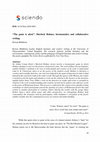
Ars Aeterna, 2020
Sir Arthur Conan Doyle's Sherlock Holmes stories involve a hermeneutic game in which Holmes attem... more Sir Arthur Conan Doyle's Sherlock Holmes stories involve a hermeneutic game in which Holmes attempts to uncover the mystery of unsolved crime. The work of Hans-Georg Gadamer enables Holmes's methods to be seen as both playful and creative as he seeks to understand what G. K. Chesterton refers to as the poetry of the modern world. Holmes is therefore a creative and scientific detective, one who loses himself in the game of detection in order to find himself in the search for truth in the wider world. Through the agency of Dr Watson, the reader is invited to join the game and attempt to work out the solution to the mystery as the narrative unfolds before them. Peter Hühn's work on the detective as reader and writer is extended in relation to the work of understanding and creation carried out by authors who add new works to the genre of Holmesian fiction. This process is explored in the context of two playful writing workshops in which participants passed the opening of a piece of Holmesian fiction they had written to another participant to continue, before sharing the results with the group. Hans Robert Jauss's ideas about genre and other perspectives on reimagining Holmes help contextualize the strategies used by participants, while Gadamer's conception of the festive enables insights into the communal processes of creation and understanding.
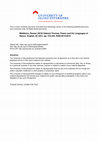
Edward Thomas’ poetry is read as belonging to the mystical tradition of English poetry, particula... more Edward Thomas’ poetry is read as belonging to the mystical tradition of English poetry, particularly in relation to Wordsworth’s conception of the poet as mediator between the ‘everyday’ appearance of the world and that which goes beyond it. Whilst Thomas may not be seen as an obvious contender for such a tradition, several of his poems concern both the physical aspects of nature and a quiet search for something beyond the physical that is felt to be there, even if access to it is uncertain or unachieved. Of particular interest are the recurring references to ‘languages’ of nature in poems such as ‘Sedge-warblers’, ‘The Word’, and examples from his prose. Thomas’ poetry is placed in the context of his time and the prevailing materialistic worldview. By rejecting the dream of the water nymph in ‘Sedge-warblers’ and focussing solely on the water of the brook, Thomas aims to write in a way that is appropriate for his time, yet also engages with the transcendent aspects of nature. Further examples of Thomas’ works are examined in relation to links between the sensitivity of children and the sensitivity of poets towards both the physical and transcendent aspects of nature. Antony Easthope’s work on empiricist poetics is discussed in relation to Thomas, as is Scott Knickerbocker’s theory of sensuous poesis. The article concludes by examining some of Thomas’ own writing and poetry that concerns the ‘aliveness’ of language, and how it can be used to create poems that achieve the vital power described by Wordsworth.
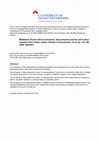
Green Letters, 2014
This article examines how Alice Oswald’s book-length poem Dart complicates and extends debates ab... more This article examines how Alice Oswald’s book-length poem Dart complicates and extends debates about the local and global. Aspects of environmentalism that focus on a physical connection with a local environment have been criticised by those such as Ursula K. Heise and Val Plumwood, who argue that such a connection is insufficient and stress the need for a greater understanding of global interconnectedness. Whilst Dart has a distinctly local emphasis in that it focuses on the river Dart in Devon and the landscape that it flows through, the poem’s envisioning of this specific geographical feature is far from being static or isolated. In addition to combining different spatial and temporal elements, Oswald’s poem transcends the physical through its engagement with the river’s spiritual and mythological aspects. The ‘fragmented’ structure used to achieve this is read as a literary example of Claude Lévi-Strauss’s ‘bricolage’ since the idea of bricolage is also relevant in relation to ideas of the self. Michael Leyshon and Jacob Bull’s work on ‘the bricolage of the here’ is used to examine the relationship between place and the identities of Dart’s characters. This enables the ‘local/global’ debate to be seen in the context of the relationship between self and world as discussed in the work of Charles Taylor and David Borthwick.
Books by Rowan Middleton
The Stolen Herd, 2018
Rowan Middleton's pamphlet recasts English pastoral poetry for a 21st century where the countrysi... more Rowan Middleton's pamphlet recasts English pastoral poetry for a 21st century where the countryside and the environment are under threat.





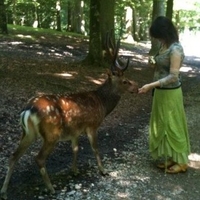
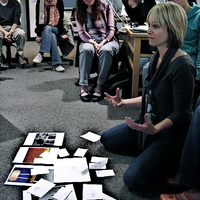




Uploads
Papers by Rowan Middleton
Books by Rowan Middleton